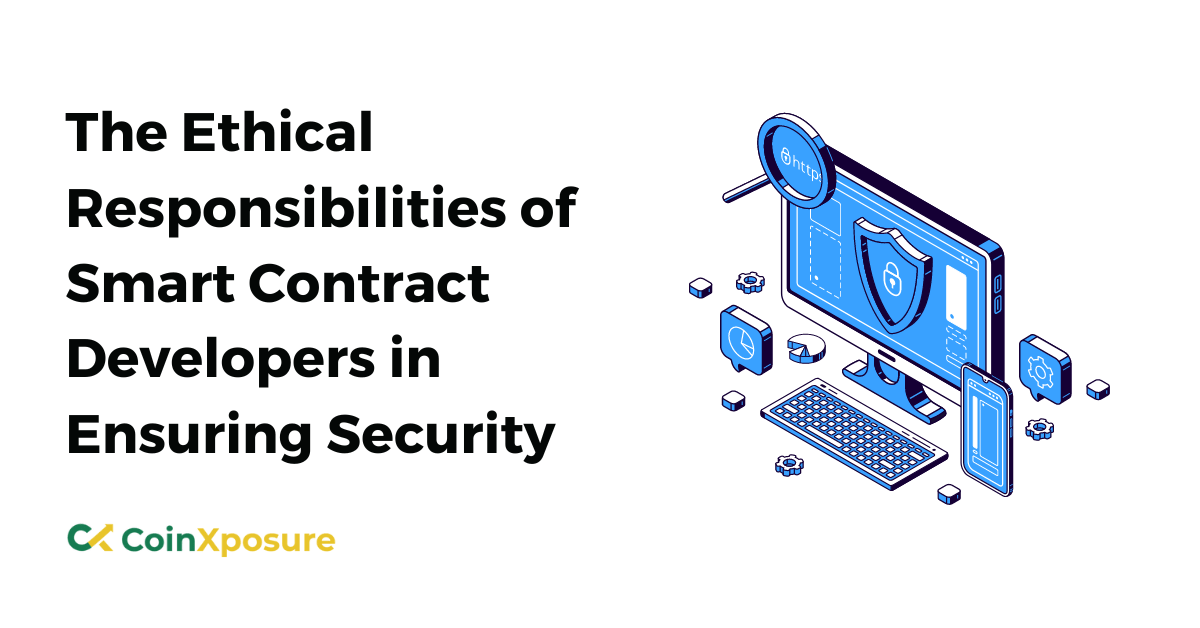Smart contracts have become central in automating and executing agreements, marking a new era amid the proliferation of blockchain technology. As these self-executing contracts gain indispensability across diverse industries, the ethical responsibilities of smart contract developers in ensuring security take center stage.
In this context, examining the ethical considerations surrounding the development of secure smart contracts becomes imperative to foster trust, protect users, and maintain the integrity of decentralized systems.
This introduction delves into the ethical dimensions of smart contract development, shedding light on the importance of security and developers’ responsibilities in safeguarding the decentralized landscape.
Understanding Security Risks for Smart Contract Developers
Understanding security risks is paramount for smart contract developers to fortify decentralized systems. This involves a comprehensive assessment of potential vulnerabilities inherent in smart contracts.
Recognizing the historical incidents and their repercussions aids developers in addressing known pitfalls. Furthermore, meticulously examining security risks enables developers to adopt proactive measures, including robust risk assessment methodologies, to fortify smart contracts against potential threats.
This foundational understanding is pivotal in cultivating a secure and resilient environment for the execution of self-executing contracts on the blockchain.
Ethical Responsibilities for Smart Contract Developers
Ethical responsibilities in smart contract development encompass various principles aimed at ensuring the integrity, security, and trustworthiness of decentralized systems. Developers bear the responsibility of transparency in code development through open-source practices and comprehensive documentation.
Rigorous testing procedures, regular audits, and collaborative code reviews are essential ethical practices to identify and rectify vulnerabilities. Continuous learning, staying informed about emerging threats, and upgrading practices demonstrate a commitment to ethical development.
User education, including clear documentation and communication of potential risks, is crucial. Collaborative efforts, industry standards, and responsible disclosure contribute to a collective commitment to ethical smart contract development.
Upholding legal and compliance standards ensures user protection, privacy, and responsible handling of disputes and incidents. These ethical responsibilities collectively form the foundation for trustworthy and secure smart contract ecosystems.
User Education for Smart Contract Developers
User education is a key ethical responsibility for smart contract developers, aiming to empower users with the knowledge necessary for secure interactions within decentralized systems.
This involves providing clear and accessible documentation that explains how the smart contract operates and any associated risks. Communicating potential vulnerabilities and best practices helps users make informed decisions.
Additionally, developers should offer guidance on secure practices, such as managing private keys, verifying contract details, and understanding the implications of transactions.
By fostering user understanding, developers contribute to a more informed and vigilant user base, enhancing smart contract applications’ overall security and reliability.
Collaborative Efforts for Smart Contract Developers
Collaborative efforts are crucial in the ethical landscape of smart contract development. Developers should actively engage in industry collaboration to establish and adhere to standards that enhance security.
Sharing knowledge and best practices within the community fosters a collective commitment to continuous improvement.
Participating in responsible disclosure of vulnerabilities promotes a transparent and collaborative approach to addressing potential threats.
By working together, developers can contribute to the resilience of decentralized systems, creating an environment where security concerns are collectively addressed, and the integrity of smart contracts is upheld.
Legal and Compliance Considerations
Legal and compliance considerations are integral ethical responsibilities for smart contract developers. Aligning with regulatory requirements ensures that decentralized systems operate within the bounds of the law. This includes addressing issues related to data protection, privacy, and any industry-specific regulations.
Developers must also responsibly handle disputes and security incidents, demonstrating a commitment to user protection and fair resolution. Upholding legal and compliance standards safeguards users and contributes to the long-term legitimacy and acceptance of smart contracts within the broader regulatory framework.
Conclusion
The ethical responsibilities of smart contract developers play a pivotal role in shaping the reliability and security of decentralized systems.
Transparent code development, rigorous testing, and regular audits underscore the commitment to user trust and system integrity. Continuous learning and proactive upgrading demonstrate a dedication to overcoming emerging threats.
User education, collaborative efforts, and adherence to legal and compliance standards collectively form a framework for ethical, smart contract development.
By embracing these responsibilities, developers create a secure and trustworthy environment, fostering decentralized technologies’ widespread adoption and success.
As the landscape evolves, the ethical considerations outlined herein remain essential for maintaining the credibility and resilience of smart contract ecosystems.












